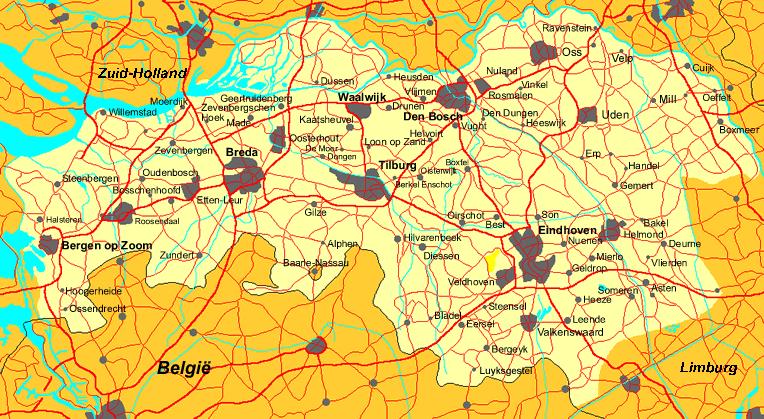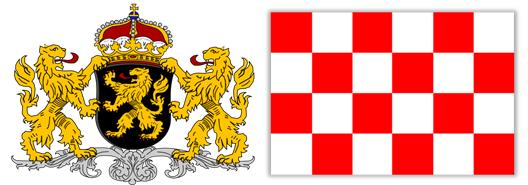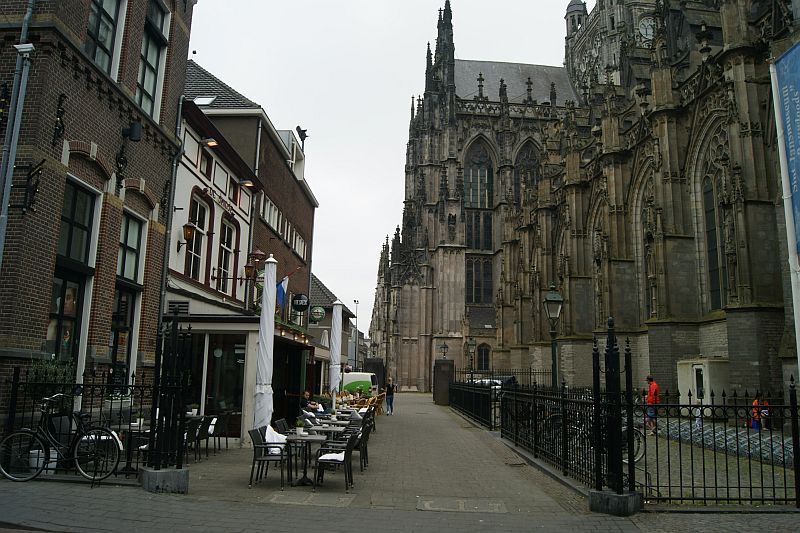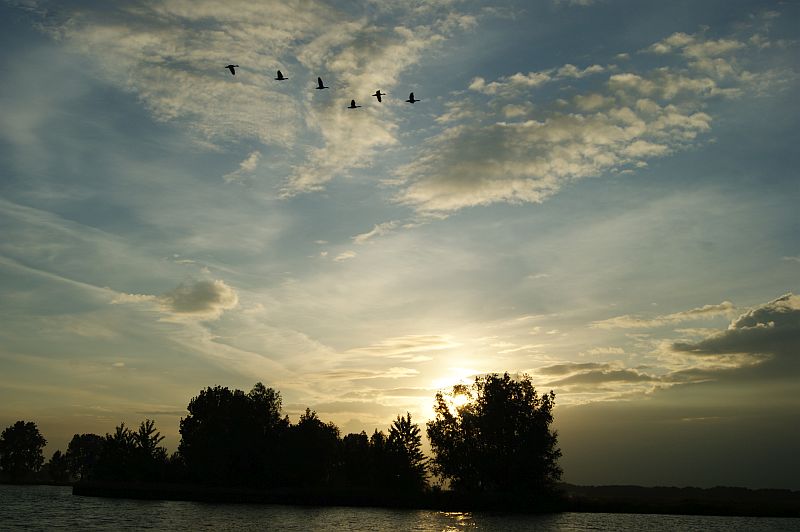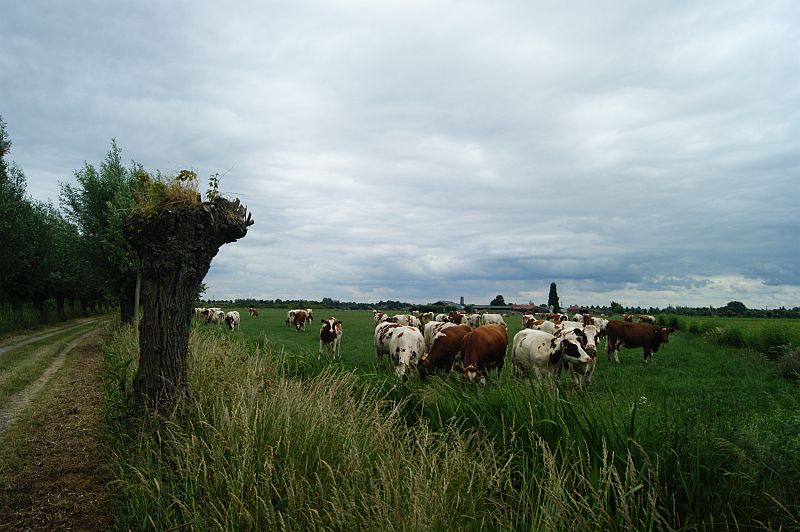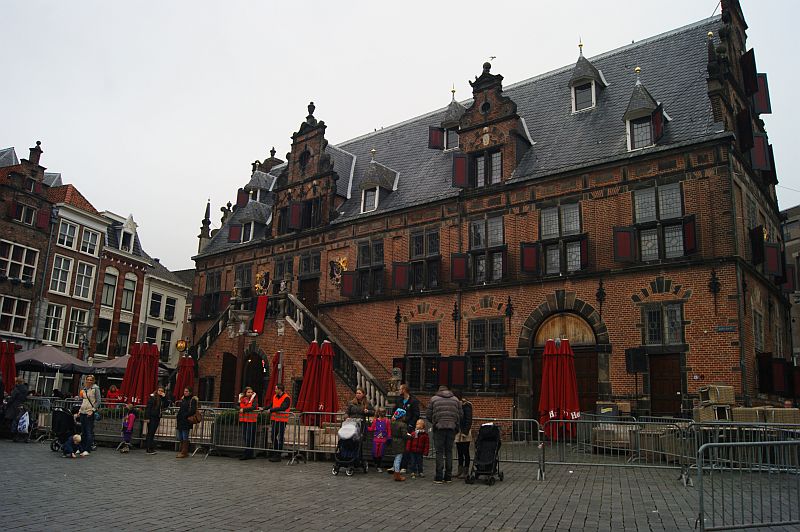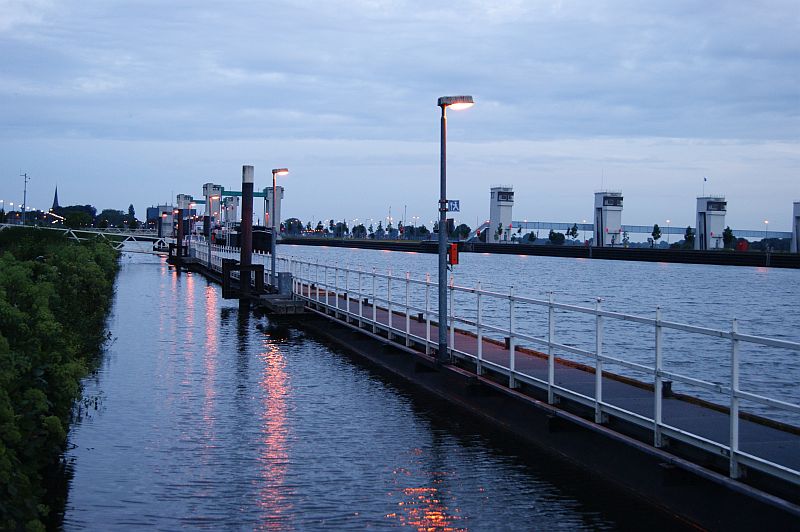The beginning of the name Brabant stems from “brac” or “wetland” which meant soggy. The second part “bant” meant “area”. So the “old” Brabant was, before the drainage, evidently a region with a very moisty soil.
The provincial coat of arm consists of a golden Dutch lion on a black field, on each side, supported by Dutch lions. A ducal crown stands atop the shield. The checkered flag is taken from the colours on the edge of the coat of arms of Dutchy of Burgundy (which, in the 14th and 15th centuries ruled this territory).
Provincial broadcast: (Radio Brabant) & (B-TV) & Teletext.
North-Brabantia in a birds eye & Weather North Brabantia & Warnings North-Brabantia.
Gouvernement North-Brabant & Norht-Brabantian “states“ (parliament) (photo’s).
Tourisme in North-Brabant.
North-Brabantian anthem: Hertog Jan (in Dutch).
-1- -1-
Toen den Hertog Jan kwam varen When the Duke John arrived
te peerd parmant al triumphant on a horse he was already triumphant
na zevenhonderd jaren after seven hundred years
hoe zong men ‘t allen kant: all people sang everywhere:
Harba lorifa, zong den Hertog, Harba lorifa, the Duke sang,
harba lorifa. harba lorifa.
Na zevenhonderd jaren after seven hundred years
in dit edel Brabants land. in this noble Brabantian county.
-2- -2-
Hij kwam van over ‘t water He came from across the water
de Scheldevloed, aan wal te voet the Scheld river ashore by foot
t’ Antwerpen op de straten in the streets of Antwerp
zilveren veren op zijn hoed: with silver feathers on his hat:
Harba lorifa, zong den Hertog, Harba lorifa, the Duke sang,
harba lorifa. harba lorifa.
t’ Antwerpen op de straten in the streets of Antwerp
lere leerzen aan zijn voet. eather boots on his feet.
-3- -3-
Och Turnhout, stedeke schone Oh Turnhout, beautiful city
zijn uw ruitjes groen, maar uw hertjes koen Are your plaids green, but brave your harts
laat den Hertog binnenkomen let the Duke be welcome
in dit zomers vrolijk seizoen. in this cheerful summer season
Harba lorifa, zong den Hertog, Harba lorifa, the Duke sang,
harba lorifa. harba lorifa.
Laat den Hertog binnenkomen let the Duke be welcome
hij heeft een peerd van doen. He needs a horse.
-4- -4-
Hij heeft een peert gekregen A horse was given to him
een schoon wit peerd, een schimmelpeerd a beautiful white horse, a …
daar is hij opgestegen he has mounted it
dien ridder onverveerd. he that fearless knight.
Harba lorifa, zong den Hertog, Harba lorifa, the Duke sang,
harba lorifa. harba lorifa.
Daar is hij opgestegen he has mounted it
en hij reed naar Valkensweerd. and he drove to Valkensweerd.
-5- -5-
In Valkensweerd daar zaten In Valkensweerd there were
al in de kast, de zilverkast already in the box, the silver box
de guldekoning zijn platen the golden armourplates of a king
die wierden aaneengelast. which were welded together.
Harba lorifa, zong den Hertog, Harba lorifa, the Duke sang,
De guldekoning zijn platen the golden armourplates of a king
toen had hij een harnas. then he had a harness.
-6- -6-
Rooise boeren, komt naar buiten Rooise farmers, come out
met de grote trom, met de kleine trom, with the bass drum, the snare drum,
trompetten cornetten ende fluiten trumpets, cornets and whistles
in dit Brabants hertogdom. into the duchy of Brabant.
Harba lorifa, zong den Hertog, Harba lorifa, the Duke sang,
harba lorifa. harba lorifa.
Trompetten en cornetten ende fluiten trumpets, cornets and whistles
in dit Brabants hertogdom. into the dutchy of Brabantharba lHarba Harba lorifa. harba lorifa.
-7- -7-
Wij reden allemaal tesamen, We drove all together,
op Oirschot aan door een kanidasselaan to Oirschot along a kanidasselane
en Jan riep: “In Gods name and Jan shouted: “In God’s name
hier hebt ik meer gestaan!” I’ve been here befor!”
Harba lorifa, zong den Hertog, Harba lorifa, the Duke sang,
harba lorifa. harba lorifa.
En Jan riep: “In Gods name And Jan shouted: “In God’s name
reikt mij mijn standard aan!” handed my standard to me!
-8- -8-
De standaard was de gouwe The standard was the celandine
die waaide dan, die draaide dan that blew over, that turned over
die droeg de Leeuw mee klauwen. that showed the Lion with claws.
Wij zongen alle man: We all men sang:
Harba lorifa, zong den Hertog, Harba lorifa, the Duke sang,
harba lorifa. harba lorifa.
Die droeg de Leeuw mee klauwen that showed the Lion with claws.
ja de Leeuw van Hertog Jan! yes de lion of Duke Jan.
-9- -9-
Hij is in den Bosch gekommen He arrived in den Bosch
al in de nacht, en niemand zag ‘t all in the night, and no one saw it
en op de Sint Jan geklommen and climbed upon the St. John
daar ging hij staan op wacht. there he stood on guard.
Harba lorifa, zong den Hertog, Harba lorifa, the Duke sang,
harba lorifa. harba lorifa.
En op de Sint Jan geklommen and climbed upon the St. John
daar staat hij dag en nacht. and stands there by day and night.
Side Marking:
Duke John I is considered to be one of the first poets who wrote in the “Diets dialect”. He is also known for a love poem “Once in the morning of may”. In this poem, the phrase “Harba lori fa” is also used. This is probably dialect for Frence: “l’herbe fait des fleurs” (the herb is in bloom), which can be translated as: “the time is right.”
The province
The province is bordered to the west by the province of Zeeland, in the northwest of the province of South Holland, in the northeast of the province of Gelderland, in the east of the province of Limburg, in the south of the Belgian province of Flemish Brabant and in the Southwest to the Belgian province of Antwerp. The seat of the provincial government is in ‘s-Hertogenbosch (Den Bosch). The province has a population density of 501 inh. / km2.
‘s-Hertogenbosch
Hollanders like to tease the Brabanders by saying that, in 1830, they (the Brabers) let the Belgiums “steal” their anthem “Brabançonne” (Brabantia, now the Belgian national anthem). So they have no own provincal anthem. That is why they use the old song “Hertog Jan” as an (unofficial) provincial anthem.
Maas
History of Brabant
The old shire Brabant dates from the time of Charlemagne. The structure and size of it were constantly changing because of many successions. Initially Brabant was small but became large after concentrating the counties of Bergen, Brussels, Leuven, Hainault and the Maasgouw (Brabant) in one hand. As a reward for the defense of Jerusalem against the attack of the Egyptian sultan Saladin (1183–1184) Henry I, Count of Brabant, was promoted by Emperor Frederick Barbarossa to a Duke. The Dutch province uses that ducal crown up until present.
Oss
The partition of Brabant into the northern- and southern part occurred during the independence war with Spain in the 16th century. The northern part, mainly Protestant, became in 1579 a member of the Republic of the United Provinces (like the northern Flanders and a part of Limburg), while the southern Catholic part remained to the Spanish Netherlands. Because Northern Brabant was later a very Catholic county, (the protestants left it!) it was not admitted as an independent province however, so got no provincial government but was as Staats-Brabant governed directly by the States-General (compare: Staats-Vlaanderen – which is now part of the Province of Zeeland – and Staats-Limburg). In 1830 Staats-Brabant decided, as the eighth province, to join the United Kingdom of the Netherlands.
Nijmegen
As in Limburg, there is in North Brabant a lively carnivals culture. This means that towns receive other names on the weekend before the start of the Catholic fasting (den Bosch is called Oeteldonk), the mayor is replaced by Prince Carnival and the municipal councils by the counsel of the 11 “princes”. They are chosen on the 11th day of the 11th month. (11 is, after all, the sacred number of the gay “lunatics”).
Oss
Oeteldonks anthem Oeteldonks volkslied.
Kwek festifal Kwekfestijn & Kwekfestijn.
Dances from Tilburg & Brabants leven.
Lithoyen
Modern times:
The library of the city Roozendaal started (2015-2-11) a corner with Polish books.
Han Tiggelaar
To be continued: modern time
Han Tiggelaar
Ciąg dalszy nastąpi

